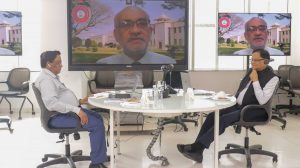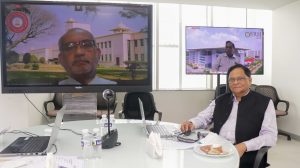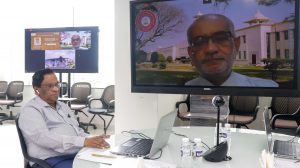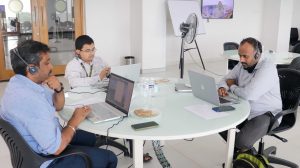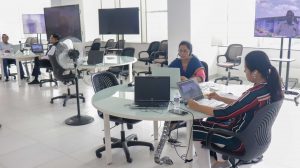Integration of Science, Engineering and Technology is the key to sustainable development
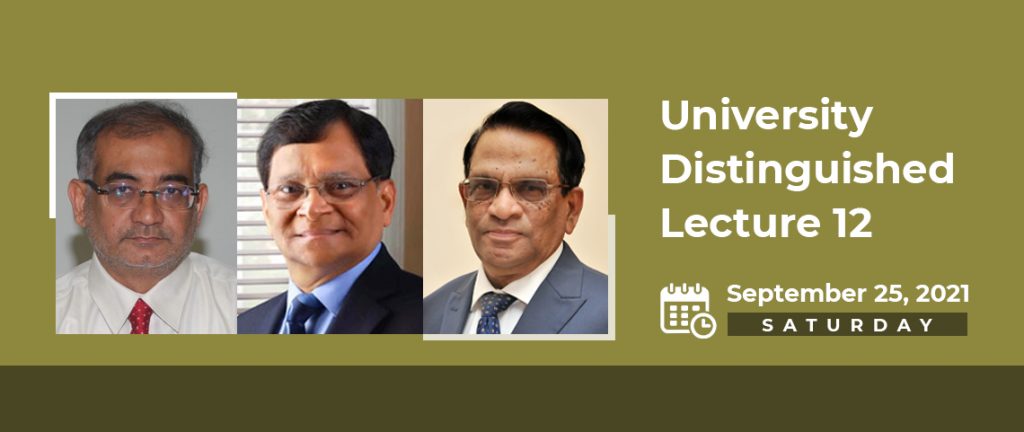 The 12th edition of the widely popular University Distinguished Lecture Series delved into the pertinent relationship between Science, Engineering and Technology. During the distinguished lecture, “Science-Engineering-Technology Synergy for Sustainable Growth”, Prof Indranil Manna well explained the correlation between the streams and how scientists, engineers and industry experts should work together for maximum societal benefits. Prof Indranil Manna, a JC Bose fellow of DST, is currently the Vice-Chancellor of BIT Mesra. The event took place on September 24, 2021, in virtual mode.
The 12th edition of the widely popular University Distinguished Lecture Series delved into the pertinent relationship between Science, Engineering and Technology. During the distinguished lecture, “Science-Engineering-Technology Synergy for Sustainable Growth”, Prof Indranil Manna well explained the correlation between the streams and how scientists, engineers and industry experts should work together for maximum societal benefits. Prof Indranil Manna, a JC Bose fellow of DST, is currently the Vice-Chancellor of BIT Mesra. The event took place on September 24, 2021, in virtual mode.
In his address, Prof Indranil Manna asserted that India is no longer a poor country but a mighty economic power with a 3 trillion dollar economy. “We are considered as one of the strongest nations of the world today, not because of the population or because of the youth living in the country, but we are the ones who could send mission to mars at the cheapest cost, and also successfully identified the existence of water on the surface of the moon. Further, we are one of the very few nuclear harnessing nations of the world,” said Prof Manna.
Science began its journey in order to find out the truths of nature. “Why?”- this question is the driving force behind Science. Though Science unravels nature and truth primarily through curiosity or need inspired acts, and the occasional outcome is significant earth-breaking discoveries, sometimes it needs technology to prove it. On the other hand, Engineering deals with “How?” and for Technology, the question is “What?”. Engineering produces certain products and devices by specific designs and inventions. However, what is absolutely essential for the society is Technology, knowledge through the path of knowing ‘why’ and ‘how’ to know ‘what’ sells. Thus, Prof Manna prescribes SET, a conjugation of Science+Engineering+Technology, as the way forward for maximum societal benefits.
Prof Manna explained that innovation means new ideas, creative thoughts, new imaginations in the form of a device or method. It is incremental, cross-disciplinary, directed and translational. Innovation matures itself via Engineering or Technological interventions. Further, sustainability is a composite concept that means the ability to maintain the desired rate or level, avoiding depletion of resources, energy or disturbing the related ecosystem.
Engineering and Technology are the key factors to sustainability. Engineers are not technicians meant only for routine production, maintenance or testing. Instead, Engineering applies the principles of science and logic to develop viable solutions to societal aspirations and challenges. The core of engineering lies in the translation, fundamental concepts to design, develop, fabricate, exploit, analyse, model, stimulate and predict,” Prof Manna elaborated.
Government of India’s Technology Vision-2035 focuses on developing the quality of life of each Indian. Science is pursuing the truth relentlessly regardless of its necessity or immediate scope of application. It provides clues, if not answers and extends as far as imagination goes. Engineering is all about enabling and providing solutions borrowing from the fundamentals of science. Technology is the last mile for societal benefit, based on scientific discovery and engineering inventions and innovations.
India is a great innovator and showcasing continuous gradual progress in it. In the Global Innovation Index (GII), India ranks 48 (2020), making it into the top 50 for the first time. Prof Manna believes that India has enough talent and potential to make it into the top 10. “Let us ensure that Science-Engineering-Technology in India complement each other and flourish together so that our society soon achieves the desired culture, growth and prosperity,” Prof Manna Concluded.
In his welcome address, Prof D Narayana Rao, Pro-Vice-Chancellor, SRM University-AP, said that the development and use of Science & Technology are critical for the achievement and sustenance of various sectors. The importance of Science and Technology to modern society and the role of the technologically educated population in promoting social and environmental developments have long been recognised. Science and technology are considered the most effective means to enhance the growth and socio-economic developments of nations. Moreover, the universalism of science and the globalisation of technological production and trade offer unprecedented opportunities for focused cooperation for scientists, engineers and the institutions that employ them to further progress in sustainable development. Even, National Education Policy-2020 advocated multidisciplinary, multi-institutional research for sustainable development.
In his concluding remarks, Prof V S Rao, Vice-chancellor, SRM University-AP, congratulated Prof Indranil Manna on delivering such a motivating lecture. He further honoured him by presenting a memento.
- Published in News, Research Events, Research News, University Distinguished Lecture
Science, Technology, and Innovation Policy 2020
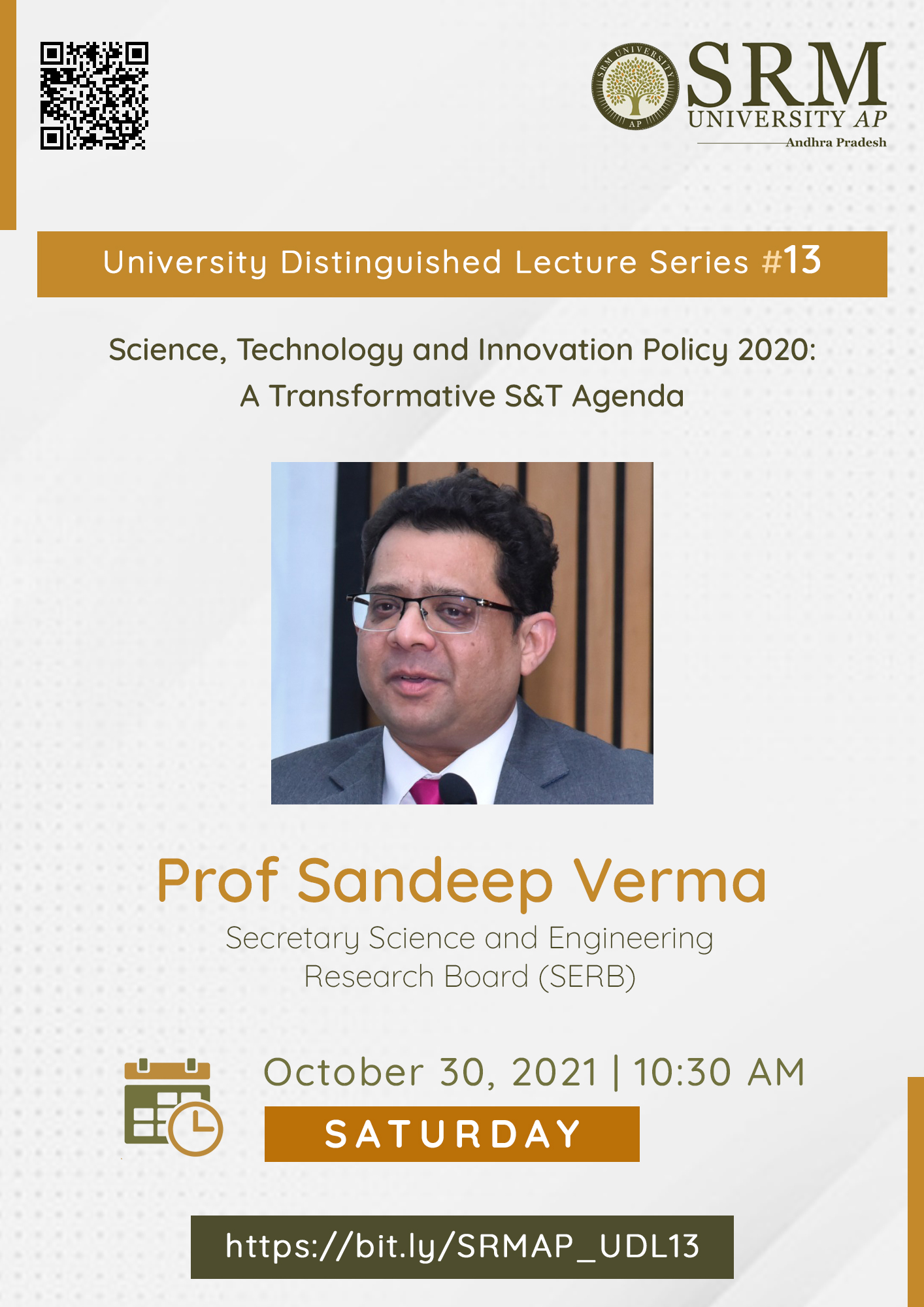 SRM University-AP is bringing forth the thirteenth edition of the University Distinguished Lecture on October 30, 2021, Saturday at 10.30 am. The globally established Dr Sandeep Verma, known for his contribution to the fields of bioorganic chemistry and chemical biology, will deliver a lecture on Science, Technology, and Innovation Policy 2020: A Transformative S&T Agenda.
SRM University-AP is bringing forth the thirteenth edition of the University Distinguished Lecture on October 30, 2021, Saturday at 10.30 am. The globally established Dr Sandeep Verma, known for his contribution to the fields of bioorganic chemistry and chemical biology, will deliver a lecture on Science, Technology, and Innovation Policy 2020: A Transformative S&T Agenda.
About the Speaker:
Dr Sandeep Verma is a member of the Science and Engineering Research Board (SERB), a statutory body established by the Parliament of India in 2008. He took charge as the secretary of SERB in 2019. SERB aims to accelerate research in Scientific and Engineering fields at a global scale by providing funds through calibrated funding for researcher mobility, awards, and honours to name a few.
Dr Sandeep Verma reserves the credit for the synthesis of enzyme mimics using metal-mediated systems. His group is engaged in developing bio-inspired soft matter and protocols for using biological building blocks as diagnostic tools for diseases.
Dr Verma received his master’s degree from Benaras Hindu University and then went for a PhD in the University of Illinois Medical Center, Chicago, USA. He went for two post-doctoral research, first at Johns Hopkins Hospital and the second at Max Planck Institute for Experimental Medicine, before returning to India to join the Indian Institute of Technology as an Assistant Professor. Dr Verma serves as an affiliated faculty in the Department of Biological Sciences and Bioengineering, Center for Nanoscience, and Center for Environmental Science and Engineering at IIT, Kanpur.
Additionally, Dr Verma is an elected fellow of the National Academy of Sciences, India, the Indian Academy of Sciences, the Indian National Science Academy (INSA), and a Senior Fellow of the Zukunftskolleg, University of Konstanz, Germany. The Chemical Research Society of India awarded him with a Silver Medal in 2017. He also received the National Prizes for Research on Interfaces between Chemistry and Biology (2017).
Along with it, Dr Verma is an Associate Editor for Chemical Communications (Royal Society of Chemistry, UK). He is also a member of the Editorial Advisory Boards of ChemBioChem, Cell Chemical Biology, and Journal of Peptide Science.
In 2010, Dr Sandeep Verma was awarded one of the highest Indian awards in the field of Science, the Shanti Swarup Bhatnagar Prize by The Council of Scientific and Industrial Research. Dr Verma won the Jawaharlal Nehru Memorial Fund Award, P. N. Bhargava Medal and BHU Vice Chancellor’s Gold Medal for academic excellence in master’s degree examination, and the J. Watumull Endowed Award of the University of Illinois at Chicago. He won the B. M. Birla Science Prize (2003), Swarnajayanti Fellowship (2005) in Chemical Sciences, and Bronze Medal (2005) of the Chemical Research Society of India.
It is an honour and an incomparable opportunity for all to have such a distinguished guest in our midst and to learn from him. The University Distinguished Lecture (UDL) hosted by SRM University-AP is attended by about 2000 members from IITs, NITs, IISERs, Universities/Institutions, CSIR, DST, DBT, DRDO, DAE, ISRO, NARL, MoES and several others from different parts of the country.
SRM University-AP cordially invites everyone to the thirteenth University distinguished Lecture that will promote transformative Scientific and Technological innovations on October 30, 2021, Saturday at 10.30 am.
Register to Join: https://bit.ly/SRMAP_UDL13 (Registration Closed)
- Published in Events, Research Events, University Distinguished Lecture
Dr Chennupati Jagadish on Semiconductor Nanostructures for Optoelectronics Applications
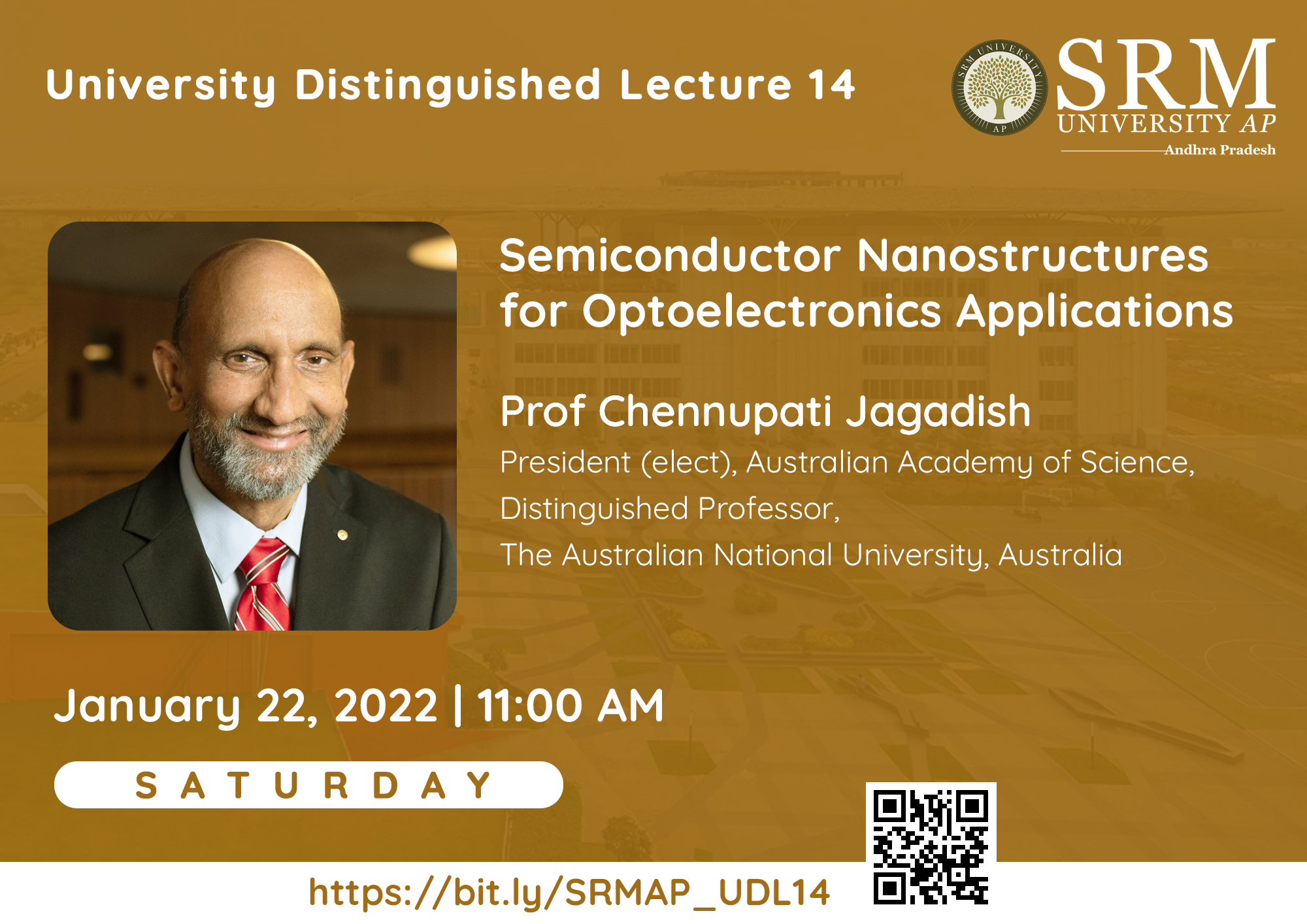 In the next installment of the University Distinguished Lecture, SRM University-AP brings to you Dr Chennupati Jagadish, a distinguished professor in Physics in the Research School of Physics and Engineering at the Australian National University. He leads the Semiconductor Optoelectronics and Nanotechnology Group as its head since its establishment in 1990 by him.
In the next installment of the University Distinguished Lecture, SRM University-AP brings to you Dr Chennupati Jagadish, a distinguished professor in Physics in the Research School of Physics and Engineering at the Australian National University. He leads the Semiconductor Optoelectronics and Nanotechnology Group as its head since its establishment in 1990 by him.
Date: January 22, 2022 (Saturday)
Time: 11.00 am IST
About the Topic:
Semiconductors have played an important role in the development of information and communications technology, solar cells, solid state lighting. Nanowires are considered as building blocks for the next generation electronics and optoelectronics. In this talk, I will present the results on optoelectronic devices such as lasers/LEDs, THz detectors, energy devices such as solar cells, photoelectrochemical (PEC) water splitting and Neuro-electrodes. Future prospects of the semiconductor nanowires will be discussed.
About the Speaker:
Dr Chennupati Jagadish obtained his Bachelor of Science degree in Physics from the Acharya Nagarjuna University in Tenali, Andhra Pradesh in the year 1977. He received his Master of Science in Applied Physics with a specialisation in Electronics from Andhra University in the year 1980. He acquired his PhD in Physics, by working on ‘Semiconducting Thin Films’, from the University of Delhi in the year 1986. He also held the position of a post-doctoral fellow in the Queens University.
Dr Jagadish moved to the Australian National University in the year 1990 and joined the newly established Department of Electronic Materials Engineering in the Research School of Physics and Engineering. He was the Vice-President and Secretary at the Australian Academy of Science for Physical Sciences for four years.
Committed to his role as an academician, Dr Jagadish also holds many honorary and guest faculty positions around the world in leading Universities such as the Oxford University, the Cambridge University, South Central University (The Republic of China), the University of Electronic Science and Technology of China, the University of Tokyo and the Taiwan National University to name a few.
He makes a frequent appearance, by invitation, to various international conferences and seminars on Material Sciences, Electronics, Quantum Electronics, Semiconductors, Physics, Photonics, and Material Sciences. As an active member of the Material Research Society, IEEE, he has delivered many talks and guest lectures as well as organised several sessions in MRS, IEEE meetings throughout the world.
Dr Chennupati Jagadish is currently the Editor-in-Chief for Applied Physics Reviews. He was earlier the Editor-in-Chief for Progress in Quantum electronics and Co-Editor-in-chief for the International Journal of High-Speed Electronics and Systems. He is also the Editor for the Journal of Semiconductor Technology and Science, Springer Series in Material Science, Springer Series in Nanoptics and Nanophotonics, Elsevier Series in Semiconductors and Semimetals, IEEE Electron Device Letters, and Light: Science and Applications of Nature Publishing Group. He is a member of the Editorial Boards of over 20 journals including ACS Nano, Physica Status Solidi: Rapid Res. Lett., IEEE Nanotechnology Magazine, IEEE Photonics Journal, Solid State Electronics, among others.
Dr Jagadish holds many laurels to his name. He became a Champion of the Order of Australia for his eminent contributions to Physics and Engineering at the Australia Day Honours 2016. He has acquired the IEEE Pioneer Award in Nanotechnology (2015), the Walter Boas Medal from the Australian Institute of Physics (2013) and the Thomas Ranken Lyle Medal from the Australian Academy of Science (2019).
He became an elected Fellow of the American Physical Society (2003). In 2020, he also became an elected member of the National Academy of Engineering for his contributions to the nanotechnology of optoelectronic devices. The Australian Research Council awarded him with the Federation Fellowship (2004-09) and with the Laureate Fellowship (2009-14).
It would be a privilege to have Dr Chennupati Jagadish, an astoundingly celebrated research personality, in our midst. We urge everyone to make the most of this opportunity. The University Distinguished Lecture (UDL) hosted by SRM University-AP is attended by about 2000 members from IITs, NITs, IISERs, Universities/Institutions, CSIR, DST, DBT, DRDO, DAE, ISRO, NARL, MoES and several others from different parts of the country.
SRM University-AP cordially invites everyone to the fourteenth University distinguished Lecture on January 22, 2022, Saturday at 11.00 am IST.
Register to Join: https://bit.ly/SRMAP_UDL14 (Registration Closed)
- Published in Events, Research Events, University Distinguished Lecture


